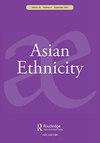Remaking ethnic nationalism: evangelical protestant women’s discourses of multiculturalism in South Korea
IF 0.8
Q3 ETHNIC STUDIES
引用次数: 0
Abstract
ABSTRACT Researchers have argued that religion has direct and indirect connections with nationalism, and they have called for conceptual clarity about the role of religion in the construction of nationalism. I extend the insights of this scholarship into reevaluating the alteration of ethnic nationalism in Korea. Drawing on interviews with evangelical Protestant women attending a megachurch in Seoul, this study explores who evangelical women are willing to include as members of Korea and in what conditions the women are inclined to include these individuals. My findings suggest that women use evangelical mission work as a rhetorical device to create a broader membership category, regardless of skin color, to imagine members of Korea. Women’s participation in volunteer works shapes their expectation of immigrants’ appreciation of Korean language, food, and civic etiquette. Challenging the prevalent view that ethnic nationalism is declining, I argue that it has survived but shifted its focus from bloodline to ethnic culture.重构民族主义:韩国福音派新教女性的多元文化话语
研究人员认为,宗教与民族主义有直接和间接的联系,他们呼吁从概念上澄清宗教在民族主义建构中的作用。我将这项研究的见解扩展到重新评估韩国民族主义的变化中。这项研究通过对参加首尔一个大教堂的福音派新教女性的采访,探讨了福音派女性愿意接纳谁为韩国成员,以及在什么条件下,女性倾向于接纳这些人。我的研究结果表明,女性利用福音派使命工作作为一种修辞手段,创造了一个更广泛的会员类别,无论肤色如何,来想象韩国的成员。女性参与志愿者工作,形成了她们对移民欣赏韩语、食物和公民礼仪的期望。我质疑种族民族主义正在衰落的普遍观点,认为它已经幸存下来,但将重点从血统转移到了种族文化。
本文章由计算机程序翻译,如有差异,请以英文原文为准。
求助全文
约1分钟内获得全文
求助全文
来源期刊

Asian Ethnicity
PHYSIOLOGY-
CiteScore
2.80
自引率
6.20%
发文量
27
期刊介绍:
In the twenty-first century ethnic issues have assumed importance in many parts of the world. Until recently, questions of Asian ethnicity and identity have been treated in a balkanized fashion, with anthropologists, economists, historians, political scientists, sociologists and others publishing their studies in single-discipline journals. Asian Ethnicity provides a cross-disciplinary, international venue for the publication of well-researched articles about ethnic groups and ethnic relations in the half of the world where questions of ethnicity now loom largest. Asian Ethnicity covers any time period, although the greatest focus is expected to be on the twentieth and twenty-first centuries.
 求助内容:
求助内容: 应助结果提醒方式:
应助结果提醒方式:


